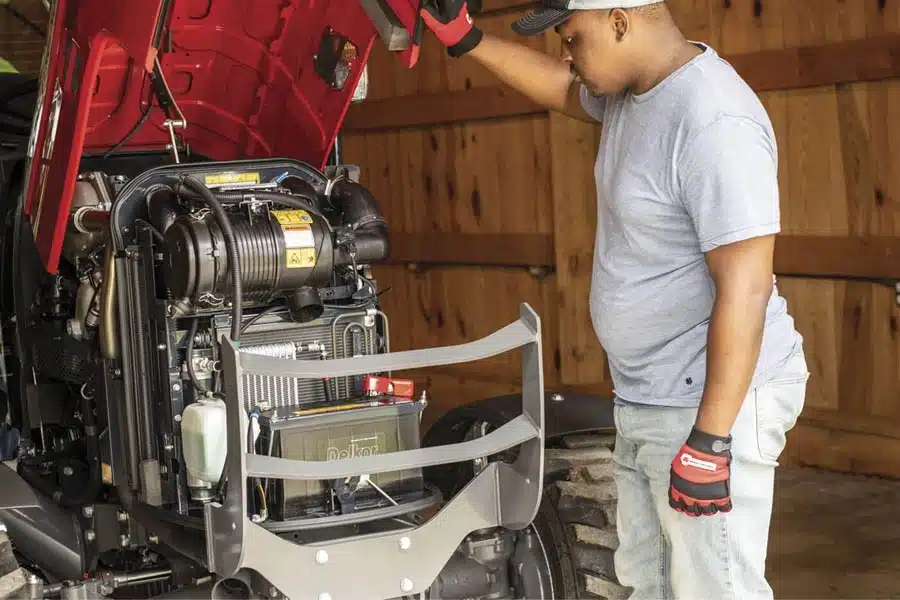Is your trusty tractor acting up again? You’re not alone.
Many tractor owners face common issues that disrupt their work and cause frustration. But don’t worry, understanding these problems is the first step to fixing them and getting back to business. In this guide, we’ll walk you through the most frequent tractor troubles and provide simple, effective solutions.
Imagine the peace of mind you’ll have when you can identify and resolve these issues yourself. Ready to gain control over your tractor’s quirks and quirks? Let’s dive into troubleshooting these common problems, ensuring your tractor stays reliable and efficient.

Engine Issues
Engine issues can halt your tractor operations swiftly. Understanding common engine problems helps in resolving them quickly. This section delves into frequent engine troubles, offering practical solutions.
Diagnosing Engine Starting Problems
Engine starting problems frustrate many tractor owners. Check the battery first. Ensure it’s charged and connections are tight. Examine the starter motor and ignition switch. Faulty components might need replacement. Fuel system clogs can also prevent starting. Inspect fuel filters and lines for blockages.
Identifying Overheating Causes
Overheating damages engine components. Check coolant levels regularly. Low coolant can lead to overheating. Inspect radiator and hoses for leaks or damage. Clean debris from the radiator. Ensure the thermostat functions correctly. Faulty thermostats disrupt coolant flow.
Resolving Power Loss Issues
Power loss affects efficiency. Check the air filter for clogs. Dirty filters restrict airflow. Inspect fuel injectors for dirt or blockages. Ensure they spray fuel evenly. Engine compression problems might cause power loss. Consider performing a compression test.
Addressing Unusual Engine Noise
Unusual noises indicate potential issues. Listen for knocking or rattling sounds. Check for loose or worn belts. Inspect engine mounts for wear. Ensure oil levels are adequate. Low oil can cause grinding noises. Investigate the timing belt for wear or misalignment.
Hydraulic System Failures
Hydraulic systems power essential functions in tractors. These systems control lifting, steering, and braking. Hydraulic failures can disrupt these vital operations. Understanding common hydraulic issues helps maintain tractor efficiency. Let’s explore key problems and their solutions.
1. Air In The Hydraulic System
Air can enter the hydraulic system through leaks. This causes spongy or erratic movements. Check for loose fittings or damaged seals. Bleed the system to remove trapped air. Regular inspections help prevent this issue.
2. Low Hydraulic Fluid Levels
Insufficient fluid affects system performance. It can lead to overheating or slow response. Regularly check fluid levels and top up as needed. Use the correct type of hydraulic fluid for your tractor. This ensures optimal performance and longevity.
3. Hydraulic Pump Failure
Pump failures can halt hydraulic functions. Common signs include noise or vibration. Inspect for leaks or worn components. Replace faulty pumps to restore functionality. Regular maintenance can prolong pump life.
4. Clogged Hydraulic Filters
Clogged filters restrict fluid flow. This affects system efficiency and performance. Regularly change hydraulic filters as part of maintenance. Clean or replace them to prevent clogs. Ensure smooth and efficient operation of the hydraulic system.
5. Faulty Hydraulic Valves
Hydraulic valves control fluid direction and flow. Faulty valves can cause erratic movements or failure. Inspect valves for wear or damage. Replace faulty valves promptly. This ensures consistent performance of the hydraulic system.
Understanding these common issues aids in troubleshooting hydraulic failures. Regular maintenance and inspections keep the system running smoothly.
Electrical System Troubles
Tractor electrical issues can halt your productivity on the field. Understanding common problems helps in quick resolution. Simple fixes can often address these issues. You don’t always need a professional. Let’s explore common electrical troubles.
Battery Issues
Tractor won’t start? Check the battery first. A dead battery is a frequent cause. Ensure the battery terminals are clean. Corrosion can block the current flow. Use a wire brush to clean them. If the battery is old, consider replacing it.
Starter Motor Problems
Hear a clicking sound? The starter motor may be faulty. Inspect the connections and ensure they are tight. Loose wires can hinder performance. Sometimes, the starter motor itself may need replacement. Consult your manual for guidance.
Alternator Malfunctions
Dim lights or a weak battery? The alternator might be failing. An alternator charges the battery. If faulty, the battery won’t charge properly. Use a multimeter to test the alternator. A professional mechanic can confirm the issue.
Fuse Box Concerns
Electrical components not working? Check the fuse box. A blown fuse can stop devices from functioning. Locate the faulty fuse and replace it with a new one. Always use the correct fuse rating to avoid further issues.
Wiring And Connection Issues
Loose or frayed wires can cause electrical problems. Inspect the wiring for damage or wear. Tighten any loose connections. Replace damaged wires to ensure safety and functionality. Regular checks prevent bigger issues down the line.

Transmission Problems
Transmission issues can disrupt tractor operations, causing unexpected delays. Identifying symptoms like unusual noises or gear slipping helps in troubleshooting. Regular maintenance prevents these common problems, ensuring tractors perform efficiently on the farm.
Transmission problems in tractors can be frustrating, often halting productivity at crucial times. While tractors are built tough, their transmission systems can encounter issues from time to time. Understanding these problems can save you time and money, and keep your tractor running smoothly.What Causes Transmission Issues?
Transmission issues often stem from simple maintenance oversights. Have you checked the transmission fluid lately? Low or dirty fluid can wreak havoc on performance. Regularly inspect and top off fluid levels. Another common culprit is worn-out gears. Listen for grinding noises; they often signal worn gears or bearings that need attention. Ignoring these sounds can lead to costly repairs.Signs Your Tractor Needs A Transmission Check
Is your tractor struggling to shift gears? This could indicate a transmission problem. Difficulty in shifting, especially under load, is a red flag. Have you noticed any unusual noises when operating the tractor? Clunking or whining sounds can point to transmission trouble. Address these symptoms early to prevent further damage.Diy Fixes For Minor Transmission Problems
Before calling a mechanic, try some simple fixes yourself. Start by checking and replacing the transmission fluid. Fresh fluid can often solve minor issues. Inspect the linkage for any visible damage or wear. A simple adjustment might be all you need to get things running smoothly again.When To Seek Professional Help
If DIY fixes don’t resolve the issue, it might be time to call in an expert. Persistent problems, like slipping gears or unresponsive controls, require professional intervention. Consult a mechanic if you’re unsure about the problem’s severity. Professional diagnosis can prevent minor issues from escalating into major repairs.Preventing Future Transmission Problems
Regular maintenance is your best defense against transmission problems. Schedule routine inspections and follow the manufacturer’s guidelines for servicing. Keep an eye on fluid levels and quality. Clean and adequate transmission fluid ensures your tractor runs efficiently. Have you ever had a transmission problem that stalled your work? Addressing these issues promptly can save you from downtime and costly repairs. Stay proactive, and your tractor will remain a reliable workhorse on the farm.
Conclusion
Fixing tractor issues can be simple with the right steps. Regular maintenance helps prevent many common problems. Always check oil, fuel, and filters first. Listening to your tractor can provide clues. Strange noises? Investigate immediately. Keep tools handy for quick fixes.
A well-maintained tractor lasts longer and works better. Follow these tips for smoother operations. Stay proactive and avoid costly repairs. Understanding your tractor’s needs saves time and money. Happy farming!



